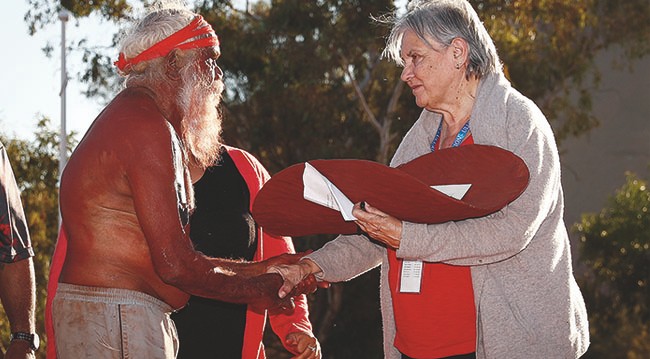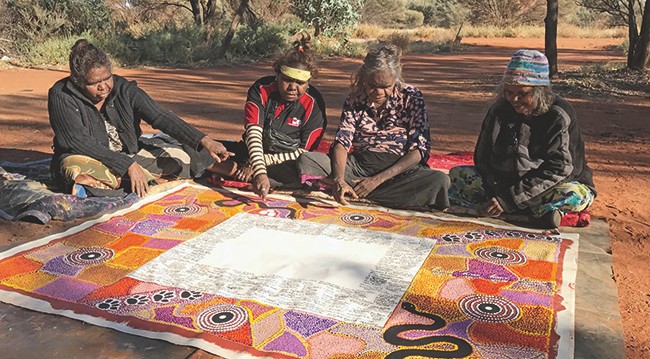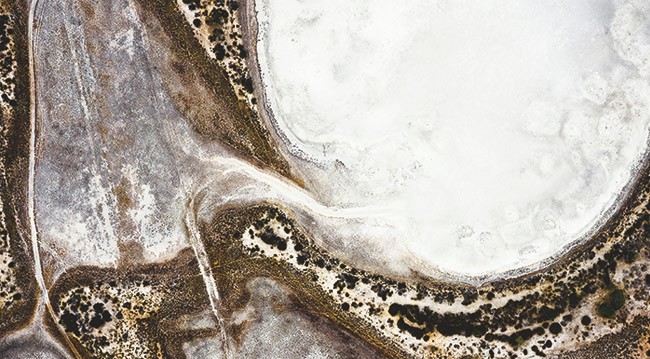Support for the First Nations voice referendum continues to gain momentum with the Uluru Statement from the Heart.
May marked the second anniversary of the Uluru Statement from the Heart. Two years on, the momentum towards a successful referendum on the first call in that statement, for a First Nations Voice, is building across politics, civil society and the public.
Of course, Australia has a long way to go before it has a constitutionally enshrined First Nations Voice and a Makarrata Commission overseeing local truth-telling and national agreement-making. But momentum is building towards the first step in these carefully sequenced reforms.
We have finally seen mainstream political leadership and bipartisanship emerging. Earlier this year, a parliamentary Joint Select Committee, with Julian Leeser (Liberal) and Senator Pat Dodson (Labor) co-chairing, accepted the Voice as the only viable reform option, and recommended a process of co-design.
There is reason for optimism. The Coalition government set aside millions of dollars in its last budget for the design of that Voice and the subsequent referendum. In May, Ken Wyatt AM became the first Indigenous person to be sworn in as Minister for Indigenous Australians.
Alongside political leadership, we are seeing the Australian public moving forward with these reforms.
The union movement has been steadfast in its support for the Uluru Statement. This year, we have seen announcements of public support and significant funding from BHP Billiton and Rio Tinto. The Australian Medical Association and the Law Council of Australia have indicated support — as have law firms and universities across Australia. At the end of May, 14 organisations indicated their support by issuing a Response to the Uluru Statement. They included BHP, Curtin University, Herbert Smith Freehills, IAG, KPMG, Lendlease, National Rugby League, PwC Australia, Qantas, Richmond Football Club, Rio Tinto, Swinburne University of Technology and Woodside.
Australian voters are also up for the challenge. In 2017, a poll conducted by Griffith University, UNSW, University of Sydney and the ANU indicated 61 per cent of Australians were supportive of a representative Voice to parliament for Aboriginal and Torres Strait Islander peoples. In 2018, Reconciliation Australia reported 95 per cent of Australians believe it is important for Indigenous people to have a say in matters that affect them. Before the recent election, the ABC Vote Compass indicated 64 per cent of Australians support the idea of changing the constitution to establish an Indigenous body to advise parliament.

Long road
There has always been incredible Aboriginal and Torres Strait Islander leadership in this process. While it started decades before, you can trace this particular push back to the 40 leaders who confronted then Prime Minister Tony Abbott and Opposition Leader Bill Shorten in July 2015. In what has become known as the Kirribilli Statement, these Indigenous leaders rejected symbolic constitutional recognition and demanded a new process, in which Aboriginal and Torres Strait Islander people were asked what form of recognition would be meaningful to them.
That led, in December 2015, to the establishment of the Referendum Council and the Indigenous Steering Committee’s conduct of 12 Regional Dialogues with Aboriginal and Torres Strait Islander communities across Australia. This culminated in the Uluru Statement from the Heart on 26 May 2017.
The statement calls for three reforms, only one of which will require constitutional change. A First Nations Voice, to allow Indigenous people to have a say in the development of policies and laws that affect them. This is a call for self-determination as well as to improve the governance of Indigenous communities.
The importance of the constitutional entrenchment of the Voice cannot be understated. It will provide the Voice with stability and certainty other bodies established for Indigenous peoples never had. Entrenchment and the referendum required to achieve it will also give the Voice the political power it needs for success. The Voice is not intended to have veto power; it will rely on political respect across the other government institutions. Its constitutional establishment will be a key part of developing this in its crucial early years. Finally, entrenchment is what delivers constitutional recognition to First Nations people. It is what redresses the current silence of the Australian Constitution in relation to their history and unique place in the Australian polity.
The second and third reforms will be achieved through a Makarrata Commission: a national treaty and truth-telling process. The idea of Makarrata — coming together after a struggle — was gifted by the Yolngu people of East Arnhem Land. It encompasses the idea of agreement-making, but is much broader. Each of the reforms — Voice, Treaty and Truth — form part of Makarrata.

What the statement represents
The strength of Aboriginal and Torres Strait Islander cultural authority sits behind the statement. The deliberative process conducted in the dialogues and at the National Constitutional Convention brought together First Nations people from across Australia. For the first time, a consensus was reached for Indigenous Australia on the question of constitutional reform.
The statement bears the word “Uluru”, gifted to the Australian people by Mutitjulu elder Uncle Sammy Wilson, who understood the importance of gifting its traditional name. The statement’s artwork was painted by Anangu women led by Rene Kulitja.
Despite being dismissed by then prime minister Malcolm Turnbull in October 2017, the statement’s reforms are mature. The First Nations Voice is at once deceptively simple and a highly sophisticated tool to achieve Indigenous self-determination in a way consistent with Australian constitutional traditions. Despite attempts to label it such, the Voice is not a third chamber of parliament. It respects the ongoing sovereignty of parliament through providing a political mechanism for First Nations people to inject their views and knowledge of their own communities into the development of policy and laws affecting them. Unlike previous reform recommendations to insert race-based rights protections into the constitution, this reform respects and continues the political dimensions of our constitutional system.
A constitutional First Nations Voice can be justified on the basis of the need to respect the self-determination of Australia’s Indigenous peoples, as recognised under international law. It can also be justified on economic rationalist grounds as a mechanism of good governance that will vastly improve the quality and effectiveness of policies and laws.
There have been attempts to undermine the reform with claims of insufficient detail. While the Statement from the Heart might contain little detail, the Referendum Council Final Report sets out its intended composition, functions and jurisdiction. Constitutional provisions are, by their nature, brief and largely conceptual, leaving the detail of the design of constitutional institutions to later legislation. This is the case in Australia with the High Court and parliament. It ensures what is constitutionalised is the enduring conceptual framework of the institution. The detail can be determined and responsively evolve in the future.
This is an opportunity for meaningful constitutional reform to shift the relationship between First Nations people and the government — to reset it in a way the Uluru Statement calls a “fuller expression of Australia’s nationhood”.
Uluru Statement

We, gathered at the 2017 National Constitutional Convention, coming from all points of the southern sky, make this statement from the heart:
Our Aboriginal and Torres Strait Islander tribes were the first sovereign Nations of the Australian continent and its adjacent islands, and possessed it under our own laws and customs. This our ancestors did, according to the reckoning of our culture, from the Creation, according to the common law from “time immemorial”, and according to science, more than 60,000 years ago.
This sovereignty is a spiritual notion: the ancestral tie between the land, or “mother nature”, and the Aboriginal and Torres Strait Islander peoples who were born therefrom, remain attached thereto, and must one day return thither to be united with our ancestors. This link is the basis of the ownership of the soil, or better, of sovereignty. It has never been ceded or extinguished, and coexists with the sovereignty of the Crown.
How could it be otherwise? That peoples possessed a land for sixty millennia and this sacred link disappears from world history in merely the last two hundred years?
With substantive constitutional change and structural reform, we believe this ancient sovereignty can shine through as a fuller expression of Australia’s nationhood.
Proportionally, we are the most incarcerated people on the planet. We are not an innately criminal people. Our children are aliened from their families at unprecedented rates. This cannot be because we have no love for them. And our youth languish in detention in obscene numbers. They should be our hope for the future.
These dimensions of our crisis tell plainly the structural nature of our problem. This is the torment of our powerlessness.
We seek constitutional reforms to empower our people and take a rightful place in our own country.
When we have power over our destiny our children will flourish. They will walk in two worlds and their culture will be a gift to their country.
We call for the establishment of a First Nations Voice enshrined in the Constitution.
Makarrata is the culmination of our agenda: the coming together after a struggle. It captures our aspirations for a fair and truthful relationship with the people of Australia and a better future for our children based on justice and self-determination.
We seek a Makarrata Commission to supervise a process of agreement-making between governments and First Nations and truth-telling about our history.
In 1967 we were counted, in 2017 we seek to be heard. We leave base camp and start our trek across this vast country. We invite you to walk with us in a movement of the Australian people for a better future.
Read the original statement at 1voiceuluru.org/the-statement
Latest news
Already a member?
Login to view this content

